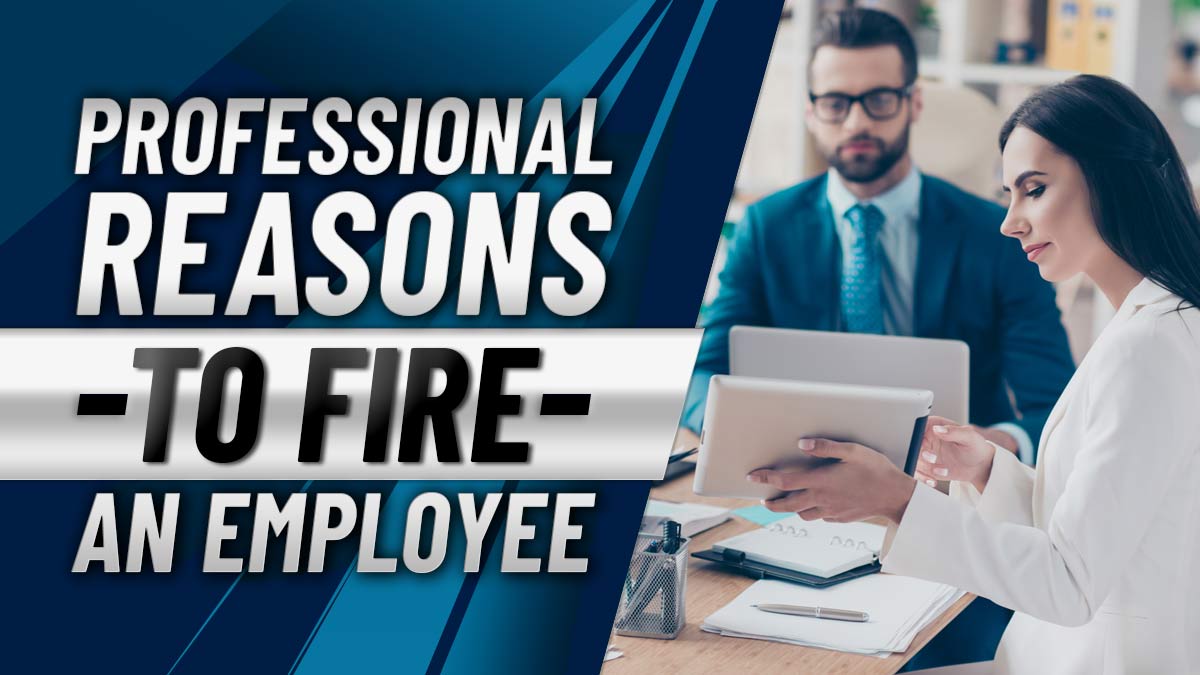Firing employees is challenging and takes a delicate and well-thought-out approach while adhering to legal guidelines. Our blog post will guide you through 27 legitimate reasons for terminating an employee while maintaining professionalism.
Understanding the Employee Termination Process
Employee termination ends an employee’s work contract with a firm. It can occur for several reasons, such as poor performance, company policy violation, or organization restructuring. Employee termination can be voluntary, where the employee resigns willingly, or involuntary, where the company decides to end the employment contract.
Top Five Offenses Leading to Termination
While there are numerous grounds for firing an employee, these are the top five common offenses:
- Poor Performance: Employees need to be better at fulfilling their duties effectively and efficiently, which could also be due to poor quality work.
- Insubordination: When an employee’s behavior is disobedient or an employee violates their superior’s official orders
- Excessive Absences: When an employee has an unreasonably high number of documented instances of unexcused absences, it reflects poorly on them and gives employers a reason to let them go.
- Bullying or Harassing Fellow Employees: Any form of physical, verbal, or psychological abuse towards a fellow employee or co-workers, and often can lead to immediate firing without advance notice.
- Conflict of Interest: When an employee’s interests interfere with their professional responsibilities and the company’s welfare.
>>Recommended Reading: How to Address Employee Performance Problems<<
#1 Employees’ lackluster Performance
Employees Poor Job Performance Across Various Work Environments and Why Fire Employees?
An employee’s inability to meet performance standards is a significant concern for employers and can decrease employee morale and may mean immediate dismissal. Poor performance can manifest in various ways, such as missing deadlines, low-quality work, or failure to meet targets, which could mean a lack of productivity, poor customer service, or inability to complete tasks in specific roles accurately.
Why does It Lead to Immediate Termination and a business to Fire employees?
Poor performance can negatively influence an organization’s productivity, morale, and profitability. Thus, it’s one of the key reasons to fire an employee. The termination decision often follows after performance improvement plans (PIP) fail or performance issues persist despite repeated warnings.
#2 Employees Defiant Behavior
Employees Insubordination in Various Contexts
Insubordination is when an employee openly disobeys or disregards a superior’s orders and, often, company policy sets a bad example for other employees. This defiance can be verbal, physical, or passive, like failing to follow instructions or rejecting company policies.
Grounds for Immediate Termination
Such behavior is detrimental to the authority of management and can disrupt workplace harmony and other employees. If an employee consistently challenges or disrespects their superiors, it can necessitate termination to maintain a respectful work environment.
#3 Employees’ Chronic Absenteeism
Employees Frequent Absences Across Different Contexts
Excessive absenteeism is when an employee consistently fails to report to work without a valid reason. In doing so, their employment agreement might involve frequent tardiness, unexcused absences, or abuse of sick leave policies.
Why It Leads to Immediate Termination
Chronic absenteeism disrupts workflow, puts undue pressure on other team members, and can impact productivity. An employee failing to adhere to attendance policies can lead to many businesses firing them.
#4 Harassment of Colleagues
Bullying or harassing coworkers creates an uncomfortable, hostile environment and warrants disciplinary action. Harassment can take various forms, including but not limited to offensive jokes, slurs, physical assaults or threats, intimidation, mockery, insults, put-downs, or gross objects or pictures, violating the employee handbook.
Why It Warrants Immediate Termination
Harassment not only causes an employee to violate workplace policies but also violates federal law and state legislation. An employee engaged in such behavior risks the organization’s reputation and morale and could lead to immediate action with legal issues.
#5 Conflicting Interests
Example of Conflict of Interest
A conflict of interest arises when an employee’s personal interests interfere with their professional responsibilities. For instance, an employee might have a financial stake in a competitor or client’s business.
Why It Justifies Immediate Termination
Such conflicts can compromise an employee’s judgment, potentially leading to decisions that benefit them personally but harm the company. Thus, it’s a valid reason for termination.
#6 Unauthorized Disclosure of Confidential Information
Breaking Client Confidentiality
Breaching client confidentiality involves the unauthorized disclosure of sensitive client information. For instance, revealing a client’s business strategy to others, especially competitors, can have serious consequences.
Release of Confidential Company Information
Employees might also disclose sensitive information on a company computer, like trade secrets, financials, company records, plans, and company documents, for personal gain or out of malice.
Grounds for Immediate Termination
When an employee violates these breaches, it can damage the company’s relationships with clients, harm its competitive position, and potentially result in legal liability. Therefore, it’s a significant reason for employee firing.
#7 Incompatible with Company Culture
Bad Cultural Fit in Different Contexts
An employee might have the required skills for a job but still need help blending with the company culture, possibly due to differing values, work styles, or interpersonal behaviors that clash with the organization’s norms.
Why It Leads to Immediate Termination
Cultural fit is crucial for maintaining a harmonious and productive work environment. Employees who consistently clash with the company culture can negatively impact team morale and productivity, justifying their dismissal.
#8 Drug or Alcohol Use During Work Hours
Examples in Various Contexts
An employee might show up to work under the influence of drugs or alcohol, or they might consume such substances at will during work hours, including both illegal substances and the misuse of legal ones, like prescription drugs or alcohol.
Grounds for Immediate Termination
Such behavior can compromise workplace safety, negatively impact productivity, and damage the company’s reputation. Thus, it’s a solid reason for immediate termination.
#9 Misrepresentation in Job Applications
Examples in Different Contexts
Some job applicants might exaggerate or falsify details on their job applications, including lying about qualifications, past job titles, or experience.
Why It Leads to Immediate Termination
Such misrepresentation can lead to hiring employees incapable of fulfilling their job duties. When such deceit is discovered, it can result in immediate termination.
#10 Downsizing
Examples in Different Contexts
Downsizing involves reducing the number of employees in a company to cut costs. It’s typically a result of financial challenges, restructuring, mergers, or shifts in the company’s strategy or market.
Why It Leads to Immediate Termination
Employees can be let go regardless of their performance or conduct in such situations. It’s necessary to ensure the company’s survival and financial stability.
#11 Inappropriate Behavior Outside of Work
Employees might engage in inappropriate or offensive behavior outside of work at will, like participating in extremist activities, posting hate speech on social media, physical violence, property damage, or engaging in illegal activities.
Why It Leads to Immediate Termination
Such behavior can damage the company’s reputation and disturb the workplace environment. If the behavior violates the company’s code of conduct or policies, it can lead to termination.
#12 Defamatory Remarks or Slander
Examples in Different Contexts
Slander involves making false spoken statements damaging to a person’s reputation. Employees might spread false rumors at will about colleagues, superiors, or the company.
Grounds for Immediate Termination
Defamatory remarks can harm an individual’s reputation and disrupt workplace harmony. They can also lead to legal issues for the company. Therefore, it’s among the acceptable reasons for dismissal.
#13 Long-term Ill Health:
Example of Different Contexts:
An employee in a physically demanding role has suffered a severe injury that prevents them from fulfilling essential job functions even with accommodations. Despite efforts to find a suitable position within the company, the employee’s condition prevents them from performing any available tasks effectively.
Why is this grounds for immediate termination:
Immediate termination might be warranted if the company cannot reasonably accommodate the employee’s health condition and their inability to perform essential job functions severely impacts productivity or safety. This decision might stem from needing more suitable alternate roles or accommodations within the company.
#14 Misusing Company Time:
Example of Different Contexts:
An employee spends hours each day tending to personal matters, checking social media platforms, or doing personal business, like making calls during work hours or playing games on a computer. Despite receiving ample written warnings, the behavior persists, affecting their work output noticeably.
Why is this grounds for immediate termination:
Immediate termination could be justified if the employee’s continual misuse of company resources and time significantly impacts productivity, jeopardizes deadlines, or sets a precedent for others to follow suit despite prior warnings or corrective actions.
#15 Statutory Illegality:
Example of Different Contexts:
An employee who handles sensitive customer data knowingly shares confidential information with external parties, breaching data privacy laws and company policies.
Why is this grounds for immediate termination:
Immediate termination might be necessary to mitigate legal risks and protect the company’s reputation. This action could demonstrate a zero-tolerance approach to illegal activities that could harm the business or violate regulations.
#16 Continual Violations:
Example of Different Contexts:
Employees disregard safety protocols, even after multiple warnings, putting themselves and others at risk.
Why is this grounds for immediate termination:
Immediate termination could be warranted to ensure a safe working environment and to demonstrate the seriousness of adherence to company policies, especially when it involves safety measures.
#17 Unethical Behavior:
Example of Different Contexts:
An employee engages in embezzlement, falsifying documents, or soliciting bribes to facilitate business deals.
Why is this grounds for immediate termination:
Immediate termination is crucial to preserve the company’s integrity, maintain ethical standards, and prevent further damage to its reputation or financial well-being.
In each case, immediate termination might be considered to prevent falsifying company records, causing further harm, upholding company standards, or mitigating potential risks posed by the employee’s actions. However, the decision for immediate termination should be taken under legal requirements and company policies.
#18 Lack of Adaptability or Learning Curve:
Example of Different Contexts:
Despite training and support, employees consistently need help to grasp new technologies, methods, or responsibilities essential to their role.
Why is this grounds for termination:
In roles requiring adaptability or continuous learning, persistent inability to acquire necessary skills might warrant termination if it affects job performance.
#19 Poor Customer Relations:
Example of Different Contexts:
Employees consistently receive customer complaints due to rude behavior, incompetence, or negligence in addressing their needs.
Why is this grounds for termination:
Continually good customer interactions can damage the company’s reputation and customer base, warranting termination if the employee’s conduct needs to improve despite feedback or training.
#20 Failure to Follow Safety Protocols:
Example of Different Contexts:
Employees consistently disregard safety protocols, jeopardizing their and others’ safety despite repeated reminders and training.
Why is this grounds for termination:
Safety violations can pose significant risks to individuals and the company’s operations, justifying termination to maintain a safe work environment.
#21 Failure to Meet Sales Targets or Key Performance Indicators (KPIs):
Example of Different Contexts:
An employee in a sales role consistently needs to meet sales targets despite coaching and support.
Why is this grounds for termination:
In sales or performance-driven roles, consistent failure to meet KPIs might lead to termination if it impacts the company’s revenue or growth.
#22 Violation of Non-Compete Agreements:
Example of Different Contexts:
An employee leaves the company and immediately starts working for a direct competitor, breaching a non-compete agreement.
Why is this grounds for termination:
Violating non-compete agreements can harm the company’s competitive edge or proprietary information, justifying termination as a measure to protect the company’s interests.
#23 Repeated Dishonesty or Deception:
Example of Different Contexts:
An employee consistently lies about work-related matters, falsifies expense reports, or deceives colleagues or management.
Why is this grounds for termination:
Persistent dishonesty undermines trust and integrity within the workplace, justifying termination to maintain a transparent and ethical work environment.
#24 Failure to Maintain Professional Boundaries:
Example of Different Contexts:
An employee engages in inappropriate relationships, harassment, or behavior that crosses professional boundaries despite counseling or warnings.
Why is this grounds for termination?
Failure to maintain professional boundaries can create a hostile work environment, disrupt team dynamics, and even lead to legal implications, justifying termination to protect the workplace culture and employee well-being.
#25 Repeated Failure to Meet Training Requirements:
Example of Different Contexts:
Employees consistently fail to complete mandatory training sessions or certifications necessary for their role despite multiple reminders and opportunities.
Why is this grounds for termination:
In roles requiring specific skills or certifications, continual failure to meet training requirements might hinder employees’ ability to perform their jobs effectively. This could warrant termination if the lack of compliance persists despite interventions and impacts job performance or legal compliance.
#26 Damaging Company Property
Example of Damaging Company Property in Different Contexts:
An employee deliberately or negligently damages company property, vehicles, or physical assets, causing financial loss or hindering operations.
Why is this grounds for termination:
Deliberate damage to company property or negligence that results in substantial financial loss or disrupts operations might justify termination to prevent further damage and uphold responsible use of company resources.
#27 Repeated Conflict with Colleagues or Management:
Example of Different Contexts:
An employee consistently engages in conflicts, disagreements, or disruptive behavior with coworkers, supervisors, or management despite attempts at mediation or counseling.
Why is this grounds for termination:
Continuous conflicts can disrupt teamwork, create a hostile work environment, and affect productivity. Termination might be considered if efforts to resolve disputes have been unsuccessful and the behavior persists, impacting the overall workplace harmony.
Best Practices When Firing an Employee
- Document Everything: Maintain a record of all performance issues, policy violations, or any other problems related to the employee. This can help justify the termination decision and protect the company in legal disputes.
- Follow Established Procedures: Adhere to the company’s termination procedures to ensure fairness and legal compliance. This might involve issuing real-time feedback warnings, conducting performance reviews, or implementing performance improvement plans.
- Communicate Effectively: Communicate the reasons for termination to the employee. This can help them understand the decision and reduce the risk of legal disputes.
- Treat the Employee with Respect: Regardless of the reasons for termination, treat the employee with dignity and respect during the termination process. This can help maintain morale among remaining employees and protect the company’s reputation.
- Support: Consider offering support like outplacement services, resume assistance, or job search resources. This can help the employee transition to a new job and demonstrate the company’s commitment to its employees.
Illegal Reasons to Fire an Employee
While many valid reasons exist to fire an employee, a specific discriminatory reason is illegal. These include termination based on discrimination (race, religion, age, etc.), retaliation, refusing to take a lie detector, breaching an employment contract, and wrongful termination. There also must be enough evidence to ensure that you adhere to the Equal Employment Opportunity Commission.
What Happens After You Fire an Employee?
After the termination, the employee is entitled to their final paycheck, including unused vacation pay. They may also be eligible for severance pay, unemployment benefits, and health insurance coverage under COBRA.
Severance Pay: Yes or No?
Depending on the company policy and the circumstances surrounding the termination, the employer may offer severance pay to the terminated employee. Severance pay is a compensation that an employer provides to an employee who has been laid off, whose job has been eliminated, or who has been fired.
>>Recommended Reading: How to Effectively Fire an Employee<<
Bottom Line
Firing employees is an inevitable part of running a company. Following these 25 reasons for employee termination will guide you in making the right decision while maintaining your professional reputation and employee morale within a positive working culture.
 Sections of this topic
Sections of this topic
















